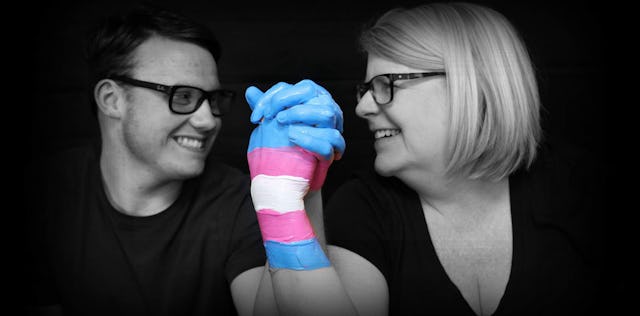I’ve Helped 600 Families With Transgender Children -- Here’s What You Need To Know

“My son is saying he is a girl because a friend at school recently transitioned and he thinks it’s cool to be transgender now. ”
“My kid thinks she’s a he because of the YouTube videos she watches endlessly.”
“‘Transitioning’ genders is not a real thing; it’s made up by internet trolls and lefties.”
“There’s no way he can know who he is at 13.”
“She’s not transgender; she’s a lesbian and doesn’t understand the difference.”
As the Founder and Executive Director of TransFamily Support Services, these are just some of the statements parents have made to me. I have sat in the homes of hundreds of families who have discovered they have a transgender or non-binary child, and have been referred to me by the local LGBT center, a Google search, or a guidance counselor or doctor.
My goal in these meetings is to walk the parents through the process of family acceptance, which in turn starts the child on their own journey to understanding and self-acceptance.
Drew Angerer/Getty
“What if she just doesn’t understand puberty and what is happening to her body, and that’s why she thinks she’s a boy?”
“What if we do medical interventions and she changes her mind?”
“What if we don’t do medical interventions and he continues to be depressed and suicidal?”
These are things I said too, when our family started on this journey with our transgender son. Like the other parents, I was afraid of moving forward.
But as my son’s depression and anxiety worsened, I became far more afraid while watching my child slip away. I came to understand that if he was telling me he was really a boy and that living life as a girl was killing him, I had to both listen and take action.
On the eve of the Caitlyn Jenner interview with Diane Sawyer, a local news crew was looking to do a story on a trans youth. My child, who had transitioned less than a year before, was interviewed, and shared such intimate parts of his life with calm and poise—unafraid of anyone else’s opinion of him. This was a new child in front of me.
Before his social transition, my child would never have talked to strangers so openly about personal things, let alone on camera. He would rarely even make eye contact with those he knew well. But in less than a year, he went from a scared, quiet, nervous, shy, depressed young girl to a confident, courageous, outgoing young man.
This is how transformational transition can be for transgender and non-binary people.
Family support plays an important role in this transformation. When the family is supportive, and children feel seen and affirmed, their distress lessens and they become the happy, joyful children they were before the dysphoria set in.
Since my son came out seven years ago, I have worked with over 600 families with trans persons from ages three to 76.
Mark Makela/Getty
Research tells us that most of us develop an understanding of gender and our identity around ages three to five. Not all transgender youth will assert their identity that young, but some do. They are not too young to know who they are.
When a child asserts their gender identity by saying things like “I am a boy” or “I am a sister, not a brother,” this is not a phase.
In those early years I endured many comments from so many well-meaning folks:
“But surely she is just confused; you know having Fetal Alcohol Syndrome must have messed up that part of her brain.”
“I read an article that said young kids who say they are transgender change their minds when they get older and then are mad at the parents for letting them do it. Do you want your kid to be mad at you? Do you want to ruin your relationship when she is an adult?”
While I know these friends and loved ones had the right intentions, these kinds of comments—the doubting, the questioning—cause pain. Pain for the child. Pain for the family. Saying these things makes a parent feel more isolated and alone.
What I teach families now is to listen to their children and honor their experience on their journey, though it is difficult and complicated in our society.
Getting to the point of acceptance for a parent, guardian, or family can be challenging. But once we are there, watch out world!
Parents of trans kids can turn into the most fierce of all mama and papa bears. We know how hard our kids are fighting for their own lives, for acceptance, against discrimination, and we join them in that fight.
Our job as parents, extended family, educators, and community is to make sure all of our kids are loved, supported, and accepted. Just as they are.
This article was originally published on